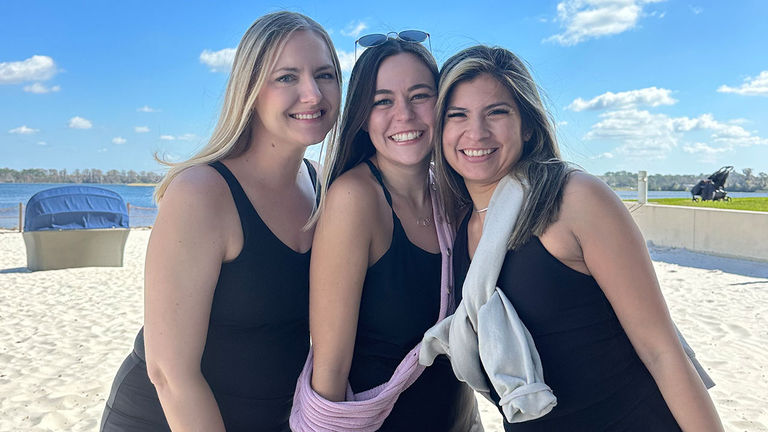When Jessica Malerman, Nicole Rivera and Shelby Reyes — three travel advisors at Marvelous Mouse Travels — first came up with the idea for a Taylor Swift-themed, fan-led Caribbean cruise, they wondered if anyone outside of their own friends and family would book the block of 50 staterooms they set aside on Royal Caribbean’s Allure of the Seas cruise ship for an October 2024 sailing.
But after a blog post about the cruise went viral late last year, the women were flooded with more inquiries than they knew what to do with (Swifties are a passionate and persistent bunch — who knew?). Soon, the 50 staterooms reserved for the “In My Cruise Era” voyage jumped to 199, and a Facebook group created by the travel agents quickly grew to more than 2,000 members.
“It was a complete shock,” says Malerman, who became an advisor last May after working for The Walt Disney Company. “I had not booked any groups prior to this. It’s a testament to how much people want to go on a group trip, and how much they want to be together, make friends and connect with people. [Swift’s] fanbase itself has cultivated an environment that’s very ‘come one, come all.’”
 From left: Marvelous Mouse’s Shelby Reyes, Jessica Mailerman and Nicole Rivera
From left: Marvelous Mouse’s Shelby Reyes, Jessica Mailerman and Nicole Rivera
Credit: 2024 Jessica MalermanAffinity trips like this Taylor Swift cruise — where travelers may not know each other, but are linked by a common interest — are a niche within group travel that 33% of travel agents are incorporating into their business models, according to a recent survey of 200 advisors, part of TravelAge West’s Need to Know research series. Of those who don’t sell affinity groups, 43% say they would like to start.
And group travel, in a broader sense, has long been a popular choice for travelers. In the same TravelAge West survey, the majority of respondents (55%) believe they will sell more group travel in 2024 than in 2023, with 51% saying this model is “very important” to their overall business. Travelers are opening their wallets, too, with 74% of agents reporting that their groups are spending more now than they were prior to the pandemic.
What constitutes a “group” of travelers can be as small as just one family unit — or as large as several hundred strangers. And all members come with their own preferences, comfort zones and travel motivators. From a travel advisor’s perspective, planning a trip that takes into account the needs of all the members may seem like a daunting task. But with a few simple tips and tricks, it can reap truly massive rewards.
The Legacy Model of Group Travel
To fully understand the evolution of group travel, it’s important to reflect on its history, says Brian Jewell, vice president and executive editor of The Group Travel Leader, a B2B publication in the group travel space.
The “Legacy Model” of group travel traces its roots to the post-World War II era, when the generation that grew up in the Depression first pioneered traveling together as a means to save money. Think of the concept of warehouse stores, Jewell says: Just as buying goods in bulk at Costco drives down the overall price of the goods, the same is true when it comes to groups. The style became especially popular in the 1950s and ‘60s, then shifted at the end of the 20th century, when these parents aged out of the marketplace and their Baby Boomer children came into the fold.
The difference between these two groups? The Boomers were more comfortable spending money.
“They didn’t have the Depression mindset [their parents had],” Jewell said. “Many were young and had traveled extensively on their own, and they had a more informed view of what was in the marketplace, and what you could get if you spent an extra $50 per night on your hotel, versus the roadside inn that your parents might have been comfortable with. They were looking for higher-end culinary experiences, and more bespoke guided experiences. From there, it just boomed.”
It’s a testament to how much people want to go on a group trip, and how much they want to be together, make friends and connect with people.
Selling Groups: Where to Begin?
Although some lingering COVID-19-era travel challenges remain (including runaway inflation that’s led to higher-than-normal hotel and airfare prices), the United Nations World Tourism Organization predicts that international travel will return to pre-pandemic numbers in 2024, and today’s group travelers are certainly back in full force.
For travel agents in particular, this presents a unique opportunity.
“It scales very well,” Jewell said. “Let’s say you’re planning for a group of 50, versus a honeymoon couple that you might traditionally plan for. You don’t do 25 times the work for that group of 50 — you might do two or three times the amount of work when you plan a group as you did for that honeymoon couple, but then you get 25 times the amount of revenue.”
You might do two or three times the amount of work when you plan a group as you did for that honeymoon couple, but then you get 25 times the amount of revenue.
One of the first steps in planning group travel is finding a reliable, trusted supplier partner to work with, says Malerman of Marvelous Mouse Travels. In the case of her affinity cruise, Royal Caribbean was an obvious choice due to the agency’s strong relationship with Mechelle Conner-Letto, a business development manager for the line.
Over at ALG Vacations, Mike Ehlers, vice president of groups, notes that the company has reported banner years for this niche in 2022 and 2023, with the heaviest group interest falling on destinations in Mexico, the Caribbean and Europe.
“We have seen the advisors who have focused on groups — or, at a minimum, offered their services for group travel — rebound quicker from the pandemic,” he said. (An average travel advisor commission for an ALG Vacations group booking is $5,000.)
“Groups are an incredible way to quickly grow your database, as one group can bring you a new set of customers to showcase your expertise and amazing service,” he said. “If the focus and attention are right, one group will help create a new set of customers for a lifetime. Plus, groups have incredible referral potential.”
If the focus and attention are right, one group will help create a new set of customers for a lifetime. Plus, groups have incredible referral potential.
And many suppliers — such as ALG Vacations and Royal Caribbean — aim to make the group booking process easier on agents, offering proprietary booking software, specific training and/or other travel incentives. At the end of 2023, ALG Vacations saw the rollout of a more streamlined way to capture and communicate flight information within their group dashboard via VAX Vacation Access. And in the first quarter of 2024, the company will launch group booking pages that advisors can customize and then share with their clients.
“We offer a full series of trainings around groups, from the basics to more complicated topics such as reading and writing group contracts, recommendations for buffering deadlines and so much more,” Ehlers said. “We realize how important training and education is — there is an entire ALGVPro module around groups — and we hired a dedicated team member to do nothing but group training for travel advisors.”
Because every company offers something different, it’s important to do research when choosing partners, Malerman says.
“It’s a big learning curve, and it depends on the vendor,” she said. “For example, if you’re booking with Virgin Voyages, it’s typically 16% on commissionable fares. But if you do a group, they bump it up to 18%, or give you a free stateroom [for every 10 paid]. And some vendors will have different commission percentages for different agencies, depending on their sales level.”
Many cruise lines will offer travel agents “tour conductor credits” for groups; these can be translated into free stateroom nights, onboard credits or even extra commission (for the Marvelous Mouse agents, the credits earned from the In My Cruise Era sailing will allow them to sail for free with their fellow Taylor Swift fans). Other suppliers will offer travel advisors a free trip if they book a certain number of travelers, or a certain number of room nights.
Almost every tourism board in the U.S. has at least one full-time salesperson whose job it is to bring groups to their destination … and whole budgets dedicated to the group market.
 Fifty-five percent of agents say they will sell more groups in 2024.
Fifty-five percent of agents say they will sell more groups in 2024.
Credit: 2024 Xavier Lorenzo/stock.adobe.comTourism boards and convention and visitors bureaus (CVBs) can also be helpful to travel advisors, according to Jewell, who calls them “the best-kept secrets in group travel.”
“Almost every tourism board in the U.S. has at least one full-time salesperson whose job it is to bring groups to their destination … and whole budgets dedicated to the group market,” he said. “They are desperate to bring [in] groups, which means that all their services are free.”
Working with a tourism board could lead to exclusive group rates, booking assistance and new ideas for tours and activities for the group. And designated “itinerary planning assistants” from the CVB will often come to greet the group and offer goodie bags or coupon books, Jewell notes.
“They also have contacts for local people,” he said. “If you want to do a VIP event — like a private bourbon tasting in Lexington, Ky. — you may not know how to make that happen, but the Lexington CVB sure does. And they’re going to connect you with the person to do it.”
Building a Group Booking A La Carte
For a travel advisor who wants sole control of the entire trip — from generating client leads and booking each component to working with multiple vendors — there’s another approach. Antoine Wilson, owner of A.D. Elite Travels, handles groups a la carte by booking the multiple pieces of a trip, then marking up the rates to earn additional commission.
These groups make up the bulk of his business; he has 11 planned for 2024.
Because Wilson is not funneling his trips though a supplier’s software, he stays organized through a booking and payments platform called WeTravel, which has the capability to create a unique, dedicated consumer-facing website for each group. In addition to offering travel packages that his clients can use to book directly from this site, the platform allows Wilson to automate group marketing emails, upload his terms and conditions, issue refunds, send out final payment reminders and collect deposits.
“Then, when I need to pay suppliers, I go to the group fund and withdraw the money,” he said. “It goes directly into my business bank account, and then I make the payments from there. When you create your own groups, your commission — or your profit, your markup — is already there. But if you go through another supplier, you might have to wait until the client goes on the trip [to receive commission]. It makes life easier for me.”
Come Along With Me Vs. Follow the Leader
The group travel experts interviewed for this story highlighted two main models of group travel: a “come-along-with-me” approach, where the travel advisor accompanies travelers on the trip, and a “follow-the-leader” model, where the travel planner designates one client as the group leader and works with them before, during and after the trip.
For Malerman, physically being on Allure of the Seas for the In My Cruise Era sailing allows for a greater sense of control, as the cruise includes logistical components such as goodie-bag stateroom drop-offs and hosted themed parties. If something goes wrong, she, Rivera and Reyes will be on-site to alleviate any problems.
On the other hand, A.D. Elite Travel’s Wilson has designated a trusted group leader for most trips, and he funnels all communication through that one person — everything from deposit gathering to handling logistical and booking concerns.
“When you have people in a group, everyone wants to talk to the travel advisor,” he said. “And I say, ‘If you have any questions, direct them to the group leader, and then the group leader will ask me the questions.’ It can really frustrate you if you have large groups, and you have people contacting you from everywhere. Having a group leader makes it a lot easier.”
It can really frustrate you if you have large groups, and you have people contacting you from everywhere. Having a group leader makes it a lot easier.
However, choosing a group leader should not be taken lightly, notes Jewell. A good group leader will have top-notch organizational skills, a strong business acumen, skillful vendor communication and excellent problem-solving abilities, all while keeping the group motivated and happy.
“The group leader is the linchpin of group travel in general,” he said, likening the role to that of a cruise director.
“That person is the face of the trip before it happens. For travel advisors, the question of whether you act as that group leader, or whether you find [someone else] really depends on personality. If you’re a travel advisor, you’ve got the business chops to do it. You’ve got the organizational chops to do it. But not every advisor wants to.”
 Advisor Antoine Wilson offers custom swag for his groups.
Advisor Antoine Wilson offers custom swag for his groups.
Credit: 2024 Antoine WilsonTaking the Plunge
For travel advisors who may be nervous to start booking groups, Wilson has sage words of advice: “Just do it.”
“I feel like a lot of people start with FIT [bookings] because they are afraid of the large numbers that come with groups,” Wilson said. “But it’s nothing to be afraid of. You may make mistakes, but you learn from your mistakes. You can reach a larger network, and the return on investment — not just commission — will get you even more clients from a group. To me, it’s about experiences. It makes me feel good when I see people happy about a trip that I planned.”
Malerman agrees.
“If I could do all groups, I would — it’s an excellent business model,” she added. “It’s not because of the commission, or the perks. I think it’s cool to be able to connect people. That’s why we started this job from the beginning — to have those experiences with people, and create them for people.”